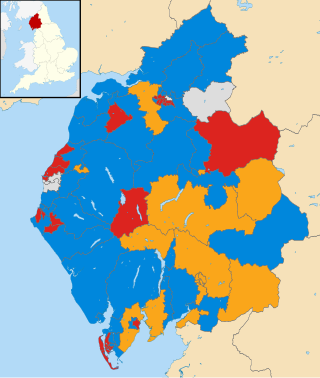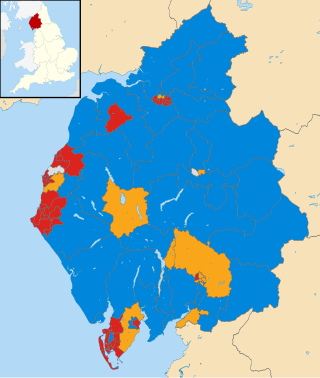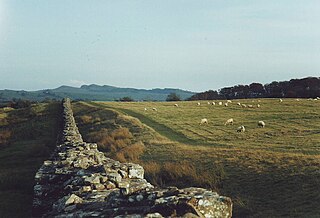
The City of Carlisle was a local government district of Cumbria, England, with the status of a city. It was named after its largest settlement, Carlisle, but covered a far larger area which included the towns of Brampton and Longtown, as well as outlying villages including Dalston, Scotby and Wetheral. In 2011 the district had a population of 107,524, and an area of 1,039.97 square kilometres (402 sq mi).
Cumbria County Council in England was elected every four years between 1973 and 2017. Since the last boundary changes in 2013, 84 councillors were elected from 84 wards for the last council before abolition in 2023.
The People's Party or Socialist People's Party was a minor political party in the Furness region of England.

The 2001 United Kingdom local elections took place on Thursday 7 June 2001. Elections took place for all of the English shire counties, some English unitary authorities and all of the Northern Ireland districts. The elections were delayed from the usual date of the first Thursday in May due to the 2001 foot and mouth crisis and were held on the same day as the 2001 general election.

Cumbria County Council was the county council for the non-metropolitan county of Cumbria in the North West of England. Established in April 1974, following its first elections held the previous year, it was an elected local government body responsible for the most significant local services in the area, including schools, roads, and social services.

An election to Cumbria County Council took place on 2 May 2009 as part of the 2009 United Kingdom local elections. All 84 councillors were elected from various electoral divisions, which returned one or two county councillors each by first-past-the-post voting for a four-year term of office. They coincided with an election for the European Parliament. All 84 seats in the Council were up for election, and a total of 301 candidates stood. The total number of people registered to vote was 392,931. Prior to the election local Conservatives were leading a coalition with the Liberal Democrats with the Labour party as the council's official opposition.

Cumberland County Council was the county council of Cumberland in the North West of England, an elected local government body responsible for most local services in the county. It was established in 1889 as a result of the Local Government Act 1888. Carlisle was initially within its area but became a separate county borough in 1914. In 1974, both authorities were merged along with parts of others into the new Cumbria County Council. In April 2023 local government in Cumbria was reorganised into two unitary authorities, one of which is named Cumberland Council and includes most of the historic county, with the exception of Penrith and the surrounding area.

Local elections were held in the United Kingdom in May 1981.

An election to Cumbria County Council took place on 2 May 2013 as part of the 2013 United Kingdom local elections. All 84 councillors were elected from electoral divisions which returned one county councillor each by first-past-the-post voting for a four-year term of office. Following an electoral review carried out by the Local Government Boundary Commission for England, newly drawn electoral divisions were used without change in the number of county councillors.

Cumberland Council is the local authority for Cumberland in England. It is a unitary authority, having the powers of a non-metropolitan county and district council combined. It was first elected in May 2022 and operated as a shadow authority until taking up its powers on 1 April 2023. Cumberland Council replaced Cumbria County Council, Allerdale Borough Council, Carlisle City Council and Copeland Borough Council.

The Cumbria Police, Fire and Crime Commissioner is the police, fire and crime commissioner, an elected official tasked with setting out the way crime is tackled by Cumbria Police in the English ceremonial county of Cumbria. The post was created in November 2012, as Cumbria Police and Crime Commissioner following an election held on 15 November 2012, and replaced the Cumbria Police Authority. Richard Rhodes was the first Cumbria Police and Crime Commissioner.

The 2017 Cumbria County Council election took place on 4 May 2017 as part of the 2017 local elections in the United Kingdom. All 84 councillors were elected from electoral divisions which return one county councillor each by first-past-the-post voting for a four-year term of office.

Elections to Cumbria County Council were held on 5 May 1977. This was on the same day as other UK county council elections. The whole council of 82 members was up for election and the Conservative Party gained control of the council, which had previously been under no overall control.

Elections to Cumbria County Council were held on 2 May 1985. This was on the same day as other UK county council elections. The whole council of 83 members was up for election and the Labour Party lost control of the council, which fell under no overall control.

Elections to Cumbria County Council were held on 7 June 2001. This was on the same day as other UK county council elections. The Labour Party lost control of the council, and was now under no overall control.

Elections to Cumbria County Council were held on 5 May 2005. This was on the same day as other UK county council elections. The Labour Party lost their majority and the council fell under no overall control.

Cumberland is a unitary authority area in Cumbria, England, which means that is a non-metropolitan county and district. It borders Scotland, Northumberland, Westmorland and Furness, and the Irish Sea. Part of the area is in the Lake District National Park and notable landmarks include Carlisle Cathedral, Carlisle Castle and Hadrian's Wall.

Westmorland and Furness is a unitary authority area in Cumbria, England. The economy is mainly focused on tourism around both the Lake District and Cumbria Coast, shipbuilding and the port in Barrow-in-Furness, and agriculture in the rural parts of the area.
The 2022 Westmorland and Furness Council election was held on 5 May 2022 to elect members of Westmorland and Furness Council in England. The council area will consist of the area covered by the districts of Barrow-in-Furness, Eden and South Lakeland.

Westmorland and Furness Council is the local authority for Westmorland and Furness in the north-west of England. It is a unitary authority, having the powers of a county council and district council combined. Westmorland and Furness Council was first elected in May 2022, operating as a shadow authority until it replaced Cumbria County Council, Barrow-in-Furness Borough Council, Eden District Council and South Lakeland District Council on 1 April 2023.
















